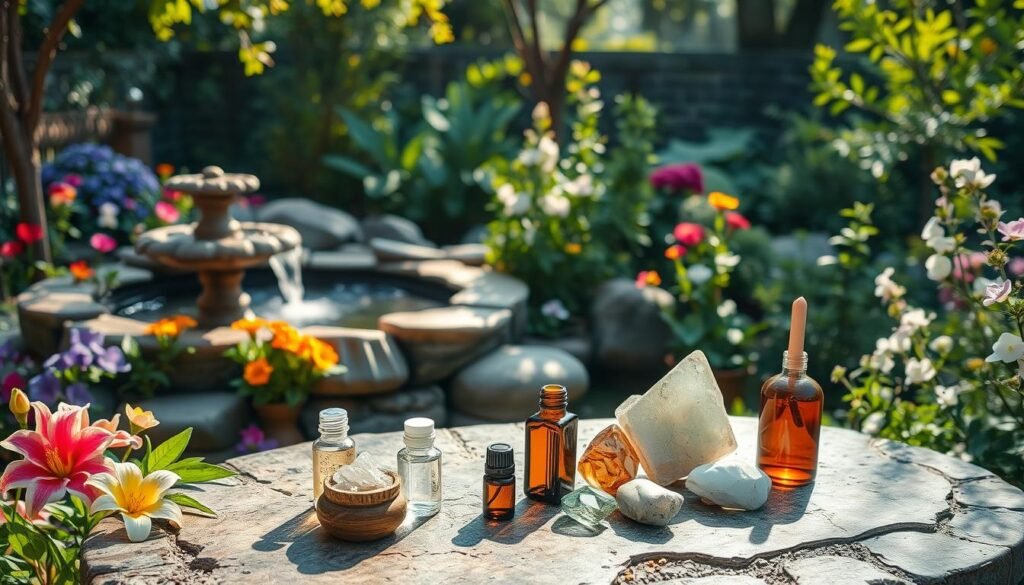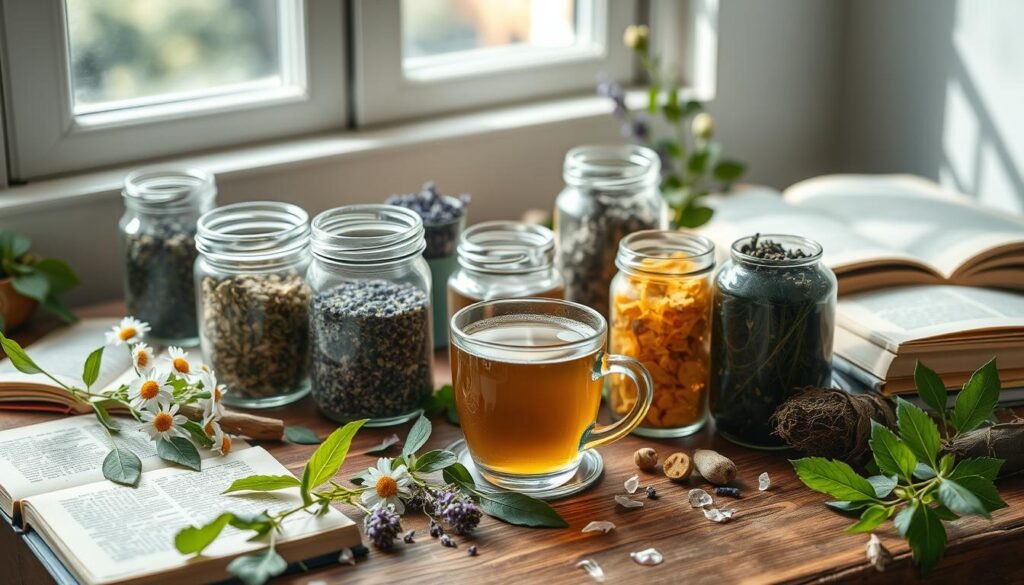It’s surprising that over 19% of U.S. adults struggle with anxiety each year. This creates a big public health problem. Many are now looking at natural and holistic methods for help, moving away from just drugs. This change shows people want to handle anxiety in a more complete way.
Mindfulness, herbal treatments, and yoga can seriously reduce stress. They bring calmness. Learning about holistic treatments for anxiety can offer new ways to find peace in life. These methods can easily be part of our everyday lives, making us feel more balanced emotionally.
Key Takeaways
- Over 19% of adults in the U.S. experience anxiety disorders annually.
- Natural remedies like chamomile and essential oils can help alleviate anxiety symptoms.
- A holistic anxiety treatment approach can incorporate various techniques, including mindfulness and yoga.
- Exercise has been shown to significantly reduce anxiety levels.
- Utilizing stress relief methods may improve the quality of life for those living with anxiety.
Understanding Anxiety Disorders
Anxiety disorders include psychological conditions with intense fear disrupting daily life. It’s important to know the symptoms of anxiety since millions struggle with it. In the U.S., around 40 million have an anxiety disorder, showing a big need for effective treatments besides medication.
Common Symptoms of Anxiety Disorders
The symptoms of anxiety show up in different ways, both emotionally and physically. Common signs are:
- Restlessness
- Panic attacks and intense fear
- Physical reactions like heart palpitations and feeling dizzy
- Problems sleeping
- Avoiding social settings
- Hard time focusing
Knowing these symptoms helps create better treatment plans. These can mix therapy with lifestyle changes.
Types of Anxiety Disorders
There are several types of anxiety disorders, each needing different treatments. Some include:
- Generalized Anxiety Disorder (GAD): Constant worry about different life aspects.
- Panic Disorder: Sudden panic attacks with physical symptoms.
- Specific Phobias: Extreme fear of certain things or situations, leading to avoiding them.
- Social Anxiety Disorder: Severe fear of socializing, causing avoidance and stress.
Treating the types of anxiety disorders helps people manage their symptoms better. Combining traditional therapy with holistic methods offers a comprehensive approach. For more on non-medication anxiety treatments, visit this resource.
The Importance of Holistic Anxiety Treatment
Understanding holistic treatment is about more than just symptoms. It treats the person as a whole. It links the mind, body, and spirit to restore balance and improve health. This gives people natural ways to relieve anxiety.
What is Holistic Treatment?
Holistic treatment uses many therapies. It looks at emotional health, physical health, social life, and lifestyle. It combines mindfulness, nutrition, and exercise for comprehensive anxiety management. This can lead to significant health improvements.
Benefits of a Holistic Approach to Anxiety
Choosing holistic therapy offers big benefits. It can improve life quality for those with anxiety. Here are some major advantages:
- Improved Emotional Wellbeing: It builds emotional strength to manage stress and anxiety better.
- Physical Health Gains: Regular exercise helps control mood and reduce stress.
- Enhanced Coping Strategies: Mindfulness strengthens the brain, enhancing mood and awareness.
- Nutritional Support: A healthy diet reduces inflammation and supports brain and neurotransmitter health.
These practices show the wide benefits of holistic therapy. It is a strong option for natural anxiety relief.

| Benefits of Holistic Therapy | Description |
|---|---|
| Emotional Resilience | Ability to cope with stress through developing emotional strength. |
| Improved Mood Regulation | Regular physical activity contributes positively to mood stability. |
| Stress Management Techniques | Mindfulness practices aid in managing and reducing anxiety symptoms effectively. |
| Nutritional Benefits | A well-rounded diet supports optimal brain health and neurotransmitter production. |
Mindfulness Meditation for Anxiety Relief
Mindfulness meditation is a strong tool for people with anxiety. It focuses on the now, easing worry-filled thoughts. With regular use, it lowers anxiety symptoms significantly.
How Mindfulness Reduces Anxiety
Mindfulness meditation brings calmness and emotional control. It’s backed by research. Mindfulness-Based Stress Reduction (MBSR) shows big drops in anxiety. Using mindfulness regularly makes a big, positive change in mental health.
Types of Mindfulness Techniques
Certain mindfulness techniques help with anxiety reduction. Here are some common ones:
- Body Scans: Focus on different parts of the body to increase awareness and relax.
- Breath Awareness: Pay attention to how you breathe to feel calm and centered.
- Guided Imagery: Use your imagination to think of peaceful images, distracting from stress.
Adding these practices to your daily life cuts down on anxiety and boosts mental health. For those looking into mindfulness meditation, great resources are available at guided meditation practices.

Herbal Remedies for Anxiety
Many people look to herbal remedies for help with anxiety. Plants and extracts can offer unique benefits to ease symptoms. If you’re thinking about herbal supplements for anxiety, it’s important to know your options.
Popular Herbs Used for Anxiety Relief
There are several herbs that might help with anxiety. Let’s talk about some of them:
- Chamomile: Chamomile is calming and may lessen anxiety. But, it can increase bleeding risk with blood thinners and cause allergic reactions in some.
- Valerian Root: Valerian can help you sleep. It’s usually safe in the short term, but we don’t know much about long-term use.
- Lavender: Lavender can be taken as a pill or used in aromatherapy to fight anxiety. Its safety during pregnancy and breastfeeding isn’t clear yet.
- Lemon Balm: This herb can help reduce anxiety, but it might cause nausea or stomach issues.
- Passionflower: Passionflower may decrease anxiety. However, it could lead to dizziness and confusion in some people.
- Kava Kava: Kava is effective against anxiety but risky because it can severely damage the liver.
- Ashwagandha: A study showed 600 mg of ashwagandha significantly lowered stress.
- CBD: CBD may help calm the nervous system, which could help those with anxiety disorders.
Safety and Efficacy of Herbal Remedies
Herbal remedies might offer relief, but their safety is key. The FDA doesn’t regulate them like prescription drugs, leading to quality differences. Be aware of possible mislabeling and contamination with heavy metals.
Always talk to a doctor before starting herbs, especially if you take other medications. Herb and medicine interactions can have serious consequences. Remember, not all herbal supplements are made the same. Be cautious as some can make you sleepy, which can be an issue for those needing to stay alert.
| Herb | Benefits | Safety Concerns |
|---|---|---|
| Chamomile | Reduces anxiety | Risk of bleeding, allergic reactions |
| Valerian Root | Promotes sleep | Limited long-term safety data |
| Lavender | Anxiety reduction | Unknown safety during pregnancy/breastfeeding |
| Lemon Balm | Alleviates anxiety | May cause nausea or stomach pain |
| Passionflower | Helps with anxiety | Can cause dizziness and confusion |
| Kava Kava | Reduces anxiety | Potential for severe liver damage |
| Ashwagandha | Reduces stress levels | Consult doctor before use |
| CBD | Calming effect | Consult doctor; interactions possible |

Yoga for Anxiety Management
Yoga is a powerful way to cope with anxiety. It touches on both mental and physical health. Practicing yoga reduces stress, anxiety, and depression. Research shows it helps increase self-awareness and manage emotions.
Benefits of Yoga in Reducing Anxiety Symptoms
Yoga builds physical strength and promotes calmness. It has been proven to lower stress and boost mood. A 2017 study found that one hatha yoga session could lower stress levels and blood pressure. It even increased self-confidence. Consistent yoga practice relaxes the nervous system and eases anxiety.
Recommended Yoga Poses for Stress Relief
Some yoga poses are especially good for reducing anxiety. Here are a few:
- Forward Bends – These bring calm by inviting reflection.
- Child’s Pose – A soothing pose that eases tension.
- Cat-Cow Stretch – Promotes flexibility and deep breathing.
- Legs-Up-the-Wall – Helps with mental and physical tiredness.
Yoga is a great tool for managing anxiety. It can improve symptoms and overall health. Always check with a doctor before starting yoga. It can bring up tough emotions and requires a safe space. If yoga makes anxiety worse, other treatments might help. For more, check out a study from NYU Grossman School of Medicine here.
Breathing Exercises to Combat Anxiety
Breathing exercises are key in tackling anxiety. They help calm the mind by activating a relaxation response. When anxious, people often breathe fast and shallow. This can make anxiety worse by reducing oxygen to the brain. So, learning and using breathing exercises is very helpful for calming anxiety.
The Science Behind Deep Breathing
Deep breathing has many positive effects on the body. It changes the way we breathe, from chest breathing to abdominal breathing. This switch can help reduce anxiety symptoms. By practicing regularly, deep breathing makes our breathing system work better, which lowers anxiety.
Effective Breathing Techniques to Practice
Here are some simple breathing techniques to try:
- Belly Breathing: Inhale deeply through your nose, letting your abdomen expand, then exhale through your mouth. Do this for 20 to 30 minutes each day for the best effect on anxiety.
- 4-7-8 Method: Breathe in for 4 seconds, hold it for 7 seconds, and exhale slowly over 8 seconds. This helps you relax.
- Box Breathing: Breathe in for 4 counts, hold for 4 counts, exhale for 4 counts, and then wait for 4 counts before you breathe in again. This creates a soothing rhythm.
- Resonant Breathing: This gentle breathing technique brings relaxation and can be done for up to 10 minutes.
- Alternate Nostril Breathing: This technique, from yoga, alternates breaths between nostrils to balance energy and lessen stress.
With these techniques, you can better control your breathing and think more clearly. Making them a part of your routine can greatly reduce anxiety and improve your overall well-being.
| Breathing Technique | Duration | Benefits |
|---|---|---|
| Belly Breathing | 20-30 minutes daily | Reduces stress and anxiety |
| 4-7-8 Method | 5 minutes | Promotes relaxation |
| Box Breathing | 5-10 minutes | Enhances focus and calmness |
| Resonant Breathing | Up to 10 minutes | Induces relaxation |
| Alternate Nostril Breathing | 5-10 minutes | Balances energy and reduces stress |
Aromatherapy and Its Role in Anxiety Relief
Aromatherapy uses essential oils to help manage anxiety naturally. These oils come from plants and have healing qualities. They are becoming more popular for treating different conditions, including anxiety. The demand for essential oils is growing worldwide.
Essential Oils for Anxiety Management
Many studies show that certain essential oils can calm anxiety. Here are some of the top ones:
- Lavender – This oil helps lower stress and improves sleep. It’s been tested in many settings, such as hospitals.
- Bergamot – Bergamot oil helps decrease anxiety before surgery.
- Chamomile – This oil reduces anxiety in cancer patients during massages.
- Citrus oils – Lemon and bergamot oils help nursing students feel less anxious before tests.
- Rose oil – Breathing in rose oil before surgery can make people feel more relaxed and less anxious.
Essential oils can be used in different ways, like in massages or through breathing them in. They help bring peace and calm. A review of 30 studies found that aromatherapy can make sleep better by easing stress, pain, anxiety, and depression. To know more about how these oils help with anxiety, check out studies on essential oils for anxiety.
How to Use Aromatherapy Safely
It’s important to use aromatherapy the right way to stay safe. Mix essential oils with other oils like coconut or olive oil to avoid skin problems. Here are some safety tips:
- Do a skin test to see if you’re allergic to a new oil.
- Never put undiluted oils on your skin.
- Talk to a doctor if you’re pregnant, nursing, or have health issues.
Adding aromatherapy to your anxiety treatment can be very helpful. It can make people waiting for treatments feel less anxious. By using aromatherapy safely, you can enjoy its calming effects without risks.
Acupuncture as a Natural Anxiety Treatment
Acupuncture is becoming a popular option for managing anxiety. It works by targeting the body’s energy pathways. Through inserting sterile needles at specific points, it aims to bring balance back. This helps reduce anxiety symptoms and boosts emotional health.
Understanding Acupuncture’s Mechanism
Acupuncture focuses on the body’s “qi” or natural energy. This method has been used in traditional Chinese medicine for thousands of years. It’s known for treating various conditions. Recently, studies show it’s effective in lessening anxiety in different disorders.
Earlier research suggested acupuncture could help. This led to more in-depth study of its effects on anxiety.
Benefits of Acupuncture for Anxiety Disorders
Many studies support acupuncture as an added treatment for anxiety. For example, a 2021 review found it lessens preoperative anxiety. Another research in the same year showed it helps with generalized anxiety disorder symptoms. A 2022 review confirmed its effectiveness in treating various types of anxiety.
Acupuncture is safe with licensed practitioners, though some may experience minor bruising. If you have certain conditions, like having a pacemaker or being pregnant, check with a doctor first. You might need several sessions for the best results, as improvement usually happens gradually.
With ongoing research, acupuncture’s role in anxiety management is getting more recognition. For example, the National Center for Complementary and Integrative Health is funding nerve stimulation research. Adding acupuncture to your anxiety treatment plan can offer a comprehensive solution. It blends traditional practices with the latest science.
Conclusion
Holistic anxiety treatment involves many methods to help the many people it affects. Techniques like mindfulness, yoga, and herbal supplements offer new hope. These methods help create a calmer, more balanced life.
By looking at the whole person, holistic strategies improve mental health. Regular exercise can lessen anxiety. Also, eating foods with omega-3s, antioxidants, and vitamins helps control mood. Ashwagandha and lavender are herbs known for their soothing effects.
Changing to these natural methods doesn’t work instantly. But, with time, they can really make a difference. They offer a way to manage anxiety with fewer side effects from drugs. Support from others and counseling adds even more benefit. A holistic path supports both your mind and emotions for the future.